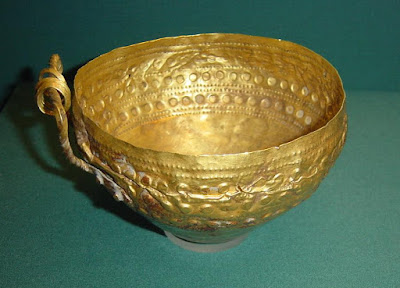This week, I read part of the Jatakas Tales by Ellen C. Babbitt as part of the weekly readings. While I had begun to read these at the start of the semester, coming back after the Ramayana and Mahabharata made them somewhat more refreshing as everything was easier to follow. There were nine stories in total, but three really stood out for one reason or another.
The first story is The Merchant of Seri. I liked this one because it seems to have an overall happy ending. While karma is seem to have originated in India, the Jatakas Tales often do not reflect that, such as stories where a character is killed for no reason. However, in this one, not only is the antagonist merchant punished for his actions, but the girl and grandmother with the bowl are rewarded. It does seem odd though, that they have a bowl made of gold and neither of them knew it. It raises so many questions about how it got there. The overarching theme is nice though, that even though they don't know it's value, the grandmother just wants something to trade with.
The second story is The Ox Who Won the Forfeit. This one mainly stood out because I have to take care of a dog now, and that means I probably shouldn't use crass or mean language when I take her for a walk or outside. The ox has many talents in the story, but when yelled at to perform, he does not, and instead chooses to sit still. This reminds me a lot of dog owners that unfortunately just yell at their dog to sit or stand still. It's a great lesson overall in obedience and treating others correctly.
The final story that stood out is the Quarrel of the Quails. The way the birds work together is reminiscent of Finding Nemo, when the fish all swam down as a team to break the net. It is surprising that the hunter kept coming back when he knew that his net was not working though. It is also surprising that right after he mentioned they just needed to be divided that they started arguing.
Overall, the Jatakas Tales were an interesting read, and I look forward to finishing this version tomorrow!
Bibliography:
Jatakas Tales by Ellen C. Babbitt
The first story is The Merchant of Seri. I liked this one because it seems to have an overall happy ending. While karma is seem to have originated in India, the Jatakas Tales often do not reflect that, such as stories where a character is killed for no reason. However, in this one, not only is the antagonist merchant punished for his actions, but the girl and grandmother with the bowl are rewarded. It does seem odd though, that they have a bowl made of gold and neither of them knew it. It raises so many questions about how it got there. The overarching theme is nice though, that even though they don't know it's value, the grandmother just wants something to trade with.
The second story is The Ox Who Won the Forfeit. This one mainly stood out because I have to take care of a dog now, and that means I probably shouldn't use crass or mean language when I take her for a walk or outside. The ox has many talents in the story, but when yelled at to perform, he does not, and instead chooses to sit still. This reminds me a lot of dog owners that unfortunately just yell at their dog to sit or stand still. It's a great lesson overall in obedience and treating others correctly.
The final story that stood out is the Quarrel of the Quails. The way the birds work together is reminiscent of Finding Nemo, when the fish all swam down as a team to break the net. It is surprising that the hunter kept coming back when he knew that his net was not working though. It is also surprising that right after he mentioned they just needed to be divided that they started arguing.
Overall, the Jatakas Tales were an interesting read, and I look forward to finishing this version tomorrow!
A golden bowl, the subject of the Merchant of Sari. Source: Wikimedia Commons
Bibliography:
Jatakas Tales by Ellen C. Babbitt

Comments
Post a Comment